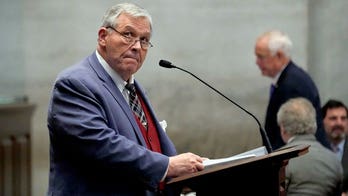Obama Sharpens Attack on Romney
Chris Stirewalt, Kirsten Kukowski and Melanie Roussell discuss the presidential election.
"It was like a vampire. They came in and sucked the life out of us."
-- Jack Cobb, formerly a worker at GST Steel, talking about Bain Capital in a new campaign ad for President Obama. The 2-minute ad, running in Florida, Missouri, Iowa, Nevada and North Carolina, tells the story of the unionized steel mill that Bain, under Romney’s leadership, failed to turn around but still profited from.
President Obama finds himself in the same place, at the same time in the election cycle as the last president to run for re-election.
[pullquote]
In early May 2004, Gallup found President George W. Bush leading Democrat John Kerry by 2 points. Today, Gallup finds Obama leading Republican Mitt Romney by 1 point. With 25 weeks to go, Obama, like Bush, is in a dead heat.
- Newsweek calls Obama ‘The First Gay President’ on cover
- How Obama played ABC News on gay marriage announcement
- Obama campaign launches attack on Romney’s jobs record at Bain
- How Obama played ABC News on gay marriage announcement
- Social conservatives claim Obama’s gay marriage endorsement could unite right
And like Bush, Obama faces an opponent who won the nomination because of perceived strength on the incumbent’s greatest weakness. For Bush it was unhappiness about the worsening state of the war in Iraq. For Obama it is deep discontentment with the anemic economy.
Democrats in 2004 nominated a highly decorated war veteran who was one of their party’s reigning authorities on foreign policy. Republicans in 2012 are about to nominate a former CEO whose specialty was turning around failing businesses.
And now, like the Bush campaign before it, Team Obama is looking to undercut their foe’s greatest perceived strength in early negative ads.
Bush broke with convention and went on the air with negative ads in March accusing Kerry of being an elitist and a flip-flopper on foreign policy. His predecessors had generally waited until the late summer or fall to go negative. But Bush, betting on a stiff challenge and wanting to use a cash and organizational advantage while Kerry was recuperating from his primary battle with John Edwards, Howard Dean and Wesley Clark to define the new Democratic standard bearer.
And while Bush was whacking at Kerry’s assumed strength, the incumbent was working hard to shore up his coalition with appeals on specific issues including gay marriage (Bush was adamantly opposed, Kerry was, like Obama has been since at least Wednesday, ambiguously supportive).
Obama is far eclipsing anything Bush might have dared do in 2004 in both scale, cost and sheer negativity. While Bush worried about being seen as un-presidential by going negative early, Obama has been blasting away for months, assured in the knowledge that any concerns about an incumbent president going on offense so soon and so harshly will be limited to mostly murmurs in the establishment press.
Obama has been on air with attack ads against Romney for weeks and is currently in the midst of a $25 million swing-state ad blitz. The current ad from the campaign is a dire depiction of one of the companies Romney’s former firm, Bain Capital, failed to turn around.
The ad is about GST Steel, a small mill outside of Kansas City. Bain took over the company in 1993, which was then on the verge of collapse, like many small to midsize producers, amid a glut of cheap foreign steel.
Bain saw potential and restructured the company, borrowing big money to modernize the operation. But, unlike Indiana steelmaker Steel Dynamics that Bain helped back to profitability around the same time, GST had a unionized workforce and a market niche. The century-old firm couldn’t compete with cheap, subsidized foreign steel being dumped on U.S. markets.
After 10 years, GST was belly up and its 750 employees were out of work and their pensions were in jeopardy. Bain, though, still saw profits. Romney’s company invested $8 million and walked away with $4 million in profit and $4.5 million in management fees.
Romney was gone from Bain by then, but the shutdown has been fodder for his political opponents ever since. While Romney counters with success stories like Steel Dynamics, Staples and Sports Authority, foes in Massachusetts and nationally have always appreciated the power of the GST story.
The argument from Obama is similar to the one that former House Speaker Newt Gingrich made amid the Republican primaries in South Carolina and Florida – that Romney wasn’t a turnaround artist but a scavenger profiting from the demise of American companies.
Like Gingrich, Obama lacks a business resume and has spent most of his professional years in public life. The goal for Obama, like Gingrich, is to say that Romney is cold-hearted and self-serving, while he, like Gingrich, is compassionate and concerned about the little guy.
Obama’s goal is that while Romney is scrambling to raise money and organize a national campaign, the former Massachusetts governor will have to simultaneously defend his record as a business whiz.
After a very rock start to the general election season for Obama, this is where a big financial advantage can pay off.
The danger for the president is this, though: he may be reinforcing Romney’s best attribute.
Democrats nominated Kerry in 2004 because they wanted someone who could counter Republican charges that the blue team were for retreat in the war with radical Islamists and out of their depth on foreign policy. A decorated Vietnam vet who was the ranking Democrat on the Senate Foreign Relations was seen as the antidote to those expected attacks.
What Bush said about Kerry was that he really was what many voters suspected about him and his party – weak and windblown. Republicans undercut Kerry’s war record and emphasized his time as a protester bashing his fellow soldiers as barbaric oppressors of the Vietnamese people, a la “Genghis Kahn.”
The Republican message of 2004: Kerry isn’t what he seems to be.
Obama’s message for 2012 is that Romney is even more of a rapacious capitalist than you think: a cold-hearted businessman who cares about bottom lines, not families.
If the economy stays lousy and voters are ready for a business-like approach to the government -- cuts, restructuring and increased efficiency – there’s nothing about Romney’s life as a capitalist swashbuckler to diminish that argument.
If Romney were running as a “compassionate conservative” like Bush or a post-partisan, shamanistic healer like Obama in 2008, the GST story would be as devastating as Kerry windsurfing. But Romney is running as the man with the ax who can cut back government after four years of Obama’s nurturing.
If Obama wants to make the most of his early advantage in money and organization, he needs to find an accusation that undercuts Romney’s biographical claim rather than hardens it.
The Day in Quotes
"But we can't fill this hole with cuts alone without doing severe damage to our schools. That's why I'm bypassing the gridlock and asking you, the people of California, to approve a plan that avoids cuts to schools and public safety."
-- Gov. Jerry Brown, D-Calif., in an online video informing constituents of an estimated $16 billion budget shortfall for the fiscal year starting July 1 – a gap of almost 20 percent. Brown’s government in January had estimated the shortfall at $9 billion. Today, Brown will lay out austerity measures he would enact if voters in November fail to approve a slate of tax cuts he has requested.
"They're asking for accomplices to austerity. We can't take part in this crime."
-- Alexis Tsipras, leader of the Coalition of the Radical Left in Greece’s parliament, talking to reporters after failed talks with President Karolos Papoulias to form a unity government and save a deal to restructure the county’s massive debt.
"Today is a very bitter day. We have been clearly defeated."
-- Norbert Röttgen, environment minister in Angela Merkel’s center-right German government, who led a slate of candidates in Germany’s largest state, North Rhine Westphalia. His Christian Democratic Union was handed a crushing defeat by a coalition of socialists and environmentalists who ran against Merkel’s austerity measures.
"I think labor will do some help. I think it won't be as much as it was in the past."
-- Richard Trumka, president of the AFL-CIO, talking to Bloomberg Television about union spending to help President Obama and other Democrats. Labor groups have already pledged $400 million to help Democrats this cycle. The figure was about $500 million in 2008.
"Being a mom isn't a pre-existing condition."
-- Sentiment in an electronic Mothers Day card offered by the White House under the banner: "Happy Mother's Day From The Affordable Care Act." “Affordable Care Act” is now the preferred name among Obama Democrats for the president’s 2010 health law.
“The state of Missouri’s position on this issue has been clearly established since 2004 [with the passage of a state constitutional amendment banning same-sex marriage] and nothing about today’s announcement changes that.”
-- John LaBombard, spokesman for Sen. Claire McCaskill, D-Mo., in a Wednesday statement to the Springfield News-Leader on President Obama’s expression of personal support for the idea of same-sex marriage.
“People are saying, ‘What in the world is going on in North Carolina?’ We look like Mississippi.”
-- Gov. Bev Perdue, D-N.C., talking to WITN of Greenville N.C. on the 61 percent of her state’s voters last week who approved a stringent ban on gay marriage.
Chris Stirewalt is digital politics editor for Fox News, and his POWER PLAY column appears Monday-Friday on FoxNews.com.





